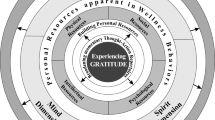Abstract
A grateful person could be said to have a lower threshold for gratitude and might feel more gratitude than others. However, both the value of gifts and the intention of helpers may be important determinations. This study aimed to examine the roles of perceived value and intention in the relationship between trait and state gratitude. Two hundred and forty-four Taiwanese individuals aged 20 or above completed measures of variables of interest. Structural equation modeling showed that goodness of value and intention naturally group together and form a unique appraisal belief (i.e., perceived goodness). Moreover, path analyses indicated that perceived goodness acted as a full mediator of the association between trait and state gratitude. In other words, people with higher levels of trait gratitude had a propensity to perceive greater value of the gift itself and the helper’s genuine helpful intentions, which may elevate their degree of state gratitude. Furthermore, a multigroup analysis found that the paths did not differ by gender. Implications for future research and limitations of the present findings are discussed.

Similar content being viewed by others
References
Algoe, S. B., Haidt, J., & Gable, S. L. (2008). Beyond reciprocity: Gratitude and relationships in everyday life. Emotion, 8, 425–429.
Anderson, J. C., & Gerbing, D. W. (1988). Structural equation modeling in practice: A review and recommended two-step approach. Psychological Bulletin, 103, 411–423.
Arbuckle, J. L. (2003). AMOS 5.0 update to the AMOS user’s guide. Chicago: Smallwaters.
Bar-Tal, D., Bar-Zohar, Y., Greenberg, M. S., & Hermon, M. (1977). Reciprocity behavior in the elationship between donor and recipient and between harm-doer and victim. Sociometry, 40, 293–298.
Beck, A. T. (1976). Cognitive therapy and the emotional disorders. Oxford: International Universities Press.
Bono, G., & McCullough, M. E. (2006). Positive responses to benefit and harm: Bringing forgiveness and gratitude into cognitive psychotherapy. Journal of Cognitive Psychotherapy, 20, 147–158.
Chen, L. H., Chen, M.-Y., Kee, Y. H., & Tsai, Y.-M. (2009). Validation of the gratitude questionnaire (GQ) in Taiwanese undergraduate students. Journal of Happiness Study, 10, 655–664.
Clore, G. L., & Schnall, S. (2005). The influence of affect on attitude. In D. Albarracin, B. T. Johnson, & M. P. Zanna (Eds.), The handbook of attitudes (pp. 436–439). Mahwah: Lawrence Erlbaum Associates.
Cohen, A. B. (2006). On gratitude. Social Justice Research, 19, 254–276.
Dumas, J. E., Johnson, M., & Lynch, A. M. (2002). Likableness, familiarity, and frequency of 844 person-descriptive words. Personality and Individual Differences, 32, 523–531.
Emmons, R. A., & Crumpler, C. A. (2000). Gratitude as human strength: Appraising the evidence. Journal of Social and Clinical Psychology, 19, 56–69.
Emmons, R. A., McCullough, M. E., & Tsang, J. (2003). The assessment of gratitude. In S. J. Lopez & C. R. Snyder (Eds.), Positive psychological assessment: A handbook of models of measures (pp. 327–341). Washington, DC: American Psychological Association.
Froh, J. J., Yurkewicz, C., & Kashdan, T. B. (2009). Gratitude and subjective well-being in early adolescence: Examining gender differences. Journal of Adolescence, 32, 633–650.
Graham, S. (1988). Children's developing understanding of the motivational role of affect: An attributional analysis. Cognitive Development, 3, 71–88.
Harpham, E. J. (2004). Gratitude in the history of ideas. In R. A. Emmons & M. E. McCullough (Eds.), The psychology of gratitude (pp. 19–36). New York: Oxford University Press.
Hu, L. T., & Bentler, P. M. (1999). Cutoff criteria for fit indexes in covariance structure analysis: Conventional criteria versus new alternatives. Structural Equation Modeling, 6, 1–55.
Kashdan, T. B., Mishra, A., Breen, W. E., & Froh, J. J. (2009). Gender differences in gratitude: Examining appraisals, narratives, the willingness to express emotions, and changes in psychological needs. Journal of Personality, 77, 691–730.
Lane, J., & Anderson, N. H. (1976). Integration of intention and outcome in moral judgment. Memory and Cognition, 4, 1–5.
Lazarus, R. S. (1968). Emotions and adaptation: Conceptual and empirical relations. In W. J. Arnold. In Nebraska symposium on motivation (Vol. 16, pp. 175–270). Lincoln: University of Nebraska Press.
Levant, R. F., & Kopecky, G. (1995). Masculinity, reconstructed. New York: Dutton.
MacKenzie, M. J., Vohs, K. D., & Baumeister, R. F. (2014). You didn’t have to do that: Belief in free will promotes gratitude. Personality and Social Psychology Bulletin, 40, 1423–1434.
MacKinnon, D. P., Lockwood, C. M., & Williams, J. (2004). Confidence limits for the indirect effect: Distribution of the product and resampling methods. Multivariate Behavioral Research, 39, 99–128.
Markus, H., Smith, J., & Moreland, R. L. (1985). Role of the self-concept in the perception of others. Journal of Personality and Social Psychology, 49, 1494–1512.
McCullough, M. E. (2002). Savoring life, past and present: Explaining what hope and gratitude share in common. Psychological Inquiry, 13, 302–304.
McCullough, M. E., Emmons, R. A., & Tsang, J. A. (2002). The grateful disposition: A conceptual and empirical topography. Journal of Personality and Social Psychology, 82, 112–127.
McCullough, M. E., Tsang, J.-A., & Emmons, R. A. (2004). Gratitude in intermediate affective terrain: Links of grateful moods to individual differences and daily emotional experience. Journal of Personality and Social Psychology, 86, 295–309.
Ptacek, J. T., Smith, R. E., & Zanas, J. (1992). Gender, appraisal, and coping: A longitudinal analysis. Journal of Personality, 60, 747–770.
Rosario, M., Shinn, M., Morch, H., & Huckabee, C. B. (1988). Gender differences in coping and social supports: Testing socialization and role constraint theories. Journal of Community Psychology, 16, 55–69.
Rosenberg, E. L. (1998). Levels of analysis and the organization of affect. Review of General Psychology, 2, 247–270.
Schachter, S., & Singer, J. E. (1962). Cognitive, social, and physiological determinants of emotional state. Psychological Review, 69, 379–399.
Scherer, K. R. (1997). Profiles of emotion-antecedent appraisal: Testing theoretical predictions across cultures. Cognition and Emotion, 11, 113–150.
Seligman, M. E. P., Steen, T. A., Park, N., & Peterson, C. (2005). Positive psychology progress: Empirical validation of interventions. American Psychologist, 60, 410–421.
Tesser, A., Gatewood, R., & Driver, M. (1968). Some determinants of gratitude. Journal of Personality and Social Psychology, 9, 233–236.
Toepfer, S. M., Cichy, K., & Peters, P. (2012). Letters of gratitude: Further evidence for author benefits. Journal of Happiness Studies, 13, 187–201.
Tsang, J.-A., Rowatt, W. C., & Buechsel, R. K. (2008). Exercising gratitude. In S. J. Lopez (Ed.), Positive psychology: Exploring the best in people (Vol. 2, pp. 37–53). Westport: Greenwood Publishing Company.
Watkins, P. C. (2014). Gratitude and the good life: Toward a psychology of appreciation. Dordrecht: Springer.
Watkins, P. C., Woodward, K., Stone, Y., & Kolts, R. L. (2003). Gratitude and happiness: Development of a measure of gratitude, and relationships with subjective well-being. Social Behavior and Personality, 31, 431–452.
Watson, D., & Naragon-Gainey, K. (2010). On the specificity of positive emotional dysfunction in psychopathology: Evidence from the mood and anxiety disorders and schizophrenia/Schizotypy. Clinical Psychology Review, 30, 839–848.
Weiner, B., Russell, D., & Lerman, D. (1979). The cognition–emotion process in achievementrelated contexts. Journal of Personality and Social Psychology, 37, 1211–1220.
Weinstein, N., Dehaan, C. R., & Ryan, R. M. (2010). Attributing autonomous versus introjected motivation to helpers and the recipient experience: Effects on gratitude, attitudes, and well-being. Motivation and Emotion, 34, 418–431.
Wood, A. M., Maltby, J., Stewart, N., Linley, P. A., & Joseph, S. (2008). A social-cognitive model of trait and state levels of gratitude. Emotion, 8, 281–290.
Wood, A. M., Froh, J. J., & Geraghty, A. W. (2010). Gratitude and well-being: A review and theoretical integration. Clinical Psychology Review, 30(7), 890-905.
Funding
This study was funded by the Ministry of Science and Technology of the Republic of China in Taiwan (Contract MOST 104–2410-H-027-020).
Author information
Authors and Affiliations
Corresponding author
Ethics declarations
Ethical Approval
All procedures performed in studies involving human participants were in accordance with the ethical standards of the institutional and/or national research committee and with the 1964 Helsinki Declaration and its later amendments or comparable ethical standards.
Informed Consent
Informed consent was obtained from all individual participants included in the study.
Conflict of Interest
The author declares that he/she has no conflict of interest.
Additional information
Publisher’s Note
Springer Nature remains neutral with regard to jurisdictional claims in published maps and institutional affiliations.




